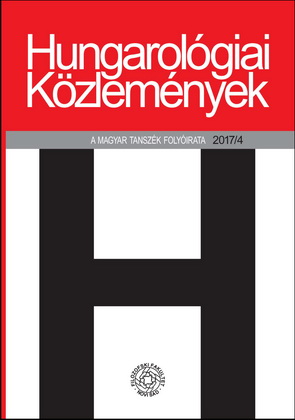ÖNMAGUNKNAK LENNI A KÖZTESSÉGBEN: KARÁTSON ENDRE: OTTHONOK I–II.
Absztrakt
A tanulmány a kulturális identitás és történelmi traumák önéletrajzi művekben megjelenített összefüggéseit kutatja. A szerző a Hungarológiai Közlemények előző számában megkezdett kutatását ezúttal az 1956-ban Franciaországba emigrált, ott komparatista egyetemi karriert befutó, ám közben magyar nyelvű szépirodalmi életművet alkotó Karátson Endre Otthonok című kétkötetes önéletírásának elemzésével folytatja. Karátson műve egyszerre illeszkedik a magyar memoárirodalom társadalmi helyzetet és történelmi kontextust előtérbe helyező hagyományába, valamint a személyes élettörténetet mint az önalkotás egzisztenciális kihívását megjelenítő, megörökítő individualista válfajába. A tanulmány idegenség és otthonlét tapasztalatának sajátos, Márai művéhez hasonló képletét fedezi fel Karátson művében. Az önéletrajz értelmezése során fontos szerepet kap a Magyarországról hozott kulturális azonosságtudat megőrzésének, érvényesítésének, alakításának vizsgálata, továbbá annak feltárása, hogy miként integrálódik a magánélet intim viszonyain keresztül a szerző azonosságtudatába a befogadó francia kultúra és társadalom értékszerkezete és viselkedésmintái.
Hivatkozások
Hites Sándor. 2011. Karátson Endre. Pozsony: Kalligram Könyvkiadó.
Karátson Endre. 2007. Otthonok. I–II. Pécs: Jelenkor.
Polouektova, Ksenia. 2009. „Is There a Place Like Home?” Jewish Narratives of Exile and Homecoming in Late Twentieth-Century East-Central Europe”. In The Exile and Return of Writers from East-Central Europe: A Compendium, szerk. John Neubauer–Borbála Zsuzsanna Török. 432–69. Berlin–New York: Walter de Gruyter.
Z. Varga Zoltán. 2017. Kulturális önazonosság, történeti trauma és személyes élettörténet közép-európai emigránsok önéletrajzaiban. Hungarológiai Közlemények 18 (3): 8–23.








